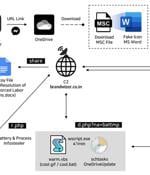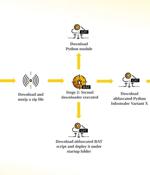Security News

Hackers are exploiting a flaw in a premium Facebook module for PrestaShop named pkfacebook to deploy a card skimmer on vulnerable e-commerce sites and steal people's payment credit card details. Promokit's pkfacebook add-on is a module that allows shop visitors to log in using their Facebook accounts, leave comments under the shop's pages, and communicate with support agents using Messenger.

The North Korea-linked Kimsuky hacking group has been attributed to a new social engineering attack that employs fictitious Facebook accounts to targets via Messenger and ultimately delivers...

Your profile can be used to present content that appears more relevant based on your possible interests, such as by adapting the order in which content is shown to you, so that it is even easier for you to find content that matches your interests. Content presented to you on this service can be based on your content personalisation profiles, which can reflect your activity on this or other services, possible interests and personal aspects.
The U.S. Federal Trade Commission has reached a settlement with telehealth firm Cerebral in which the company will pay $7,000,000 over allegations of mishandling people's sensitive health data. In March 2023, the company sent out notices of data breach to 3.2 million people who had interacted with its websites, applications, and services, that their information had been exposed due to using tracking pixels on its platform.
Cybersecurity researchers have discovered a credit card skimmer that's concealed within a fake Meta Pixel tracker script in an attempt to evade detection. Sucuri said that the malware is injected...

Hackers are using Facebook advertisements and hijacked pages to promote fake Artificial Intelligence services, such as MidJourney, OpenAI's SORA and ChatGPT-5, and DALL-E, to infect unsuspecting users with password-stealing malware. In one of the cases seen by researchers at Bitdefender, a malicious Facebook page impersonating Midjourney amassed 1.2 million followers and remained active for nearly a year before it was eventually taken down.

Facebook messages are being used by threat actors to a Python-based information stealer dubbed Snake that’s designed to capture credentials and other sensitive data. “The credentials harvested...

Facebook and Instagram users worldwide have been logged out of the sites and are having trouble logging in, receiving errors that their passwords are incorrect. The outage has caused people to automatically get logged out of Meta and for Instagram to no longer work, giving errors like "Couldn't refresh feed."

Facebook advertisers in Vietnam are the target of a previously unknown information stealer dubbed VietCredCare at least since August 2022. The malware is “notable for its ability to automatically...

A threat actor leaked 200,000 records on a hacker forum, claiming they contained the mobile phone numbers, email addresses, and other personal information of Facebook Marketplace users. IntelBroker claims this partial Facebook Marketplace database was stolen by someone using the 'algoatson' Discord handle after hacking the systems of a Meta contractor.